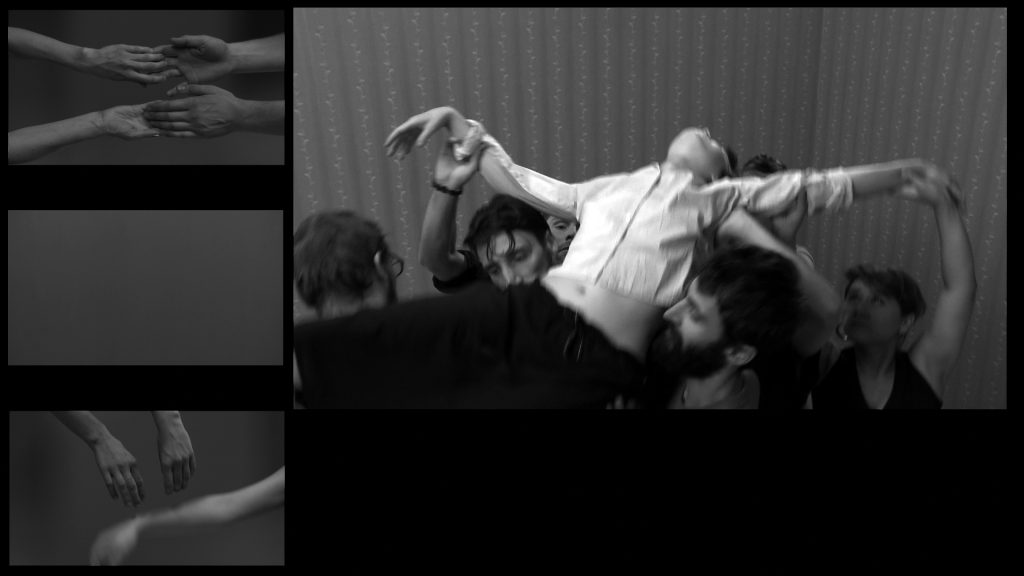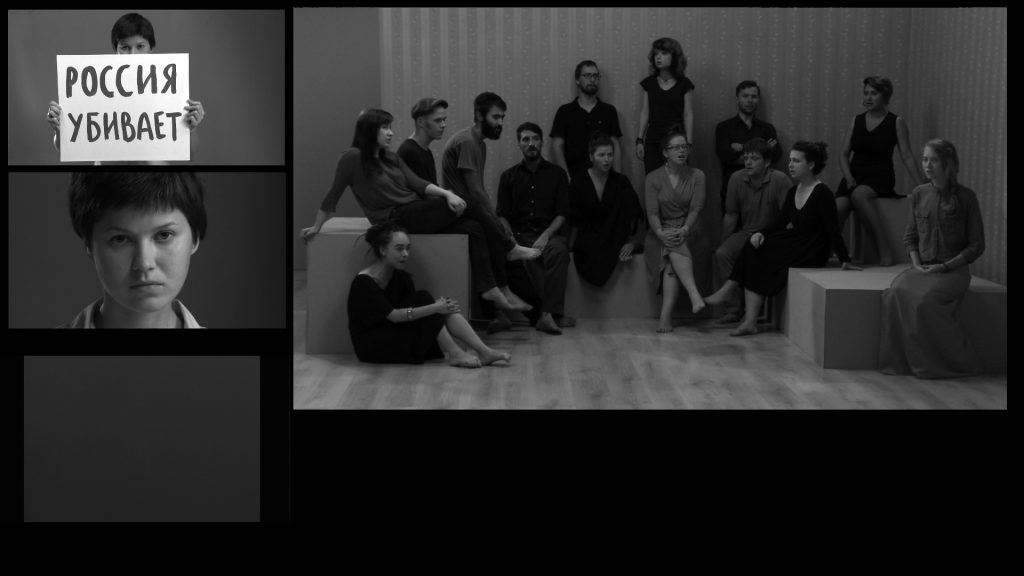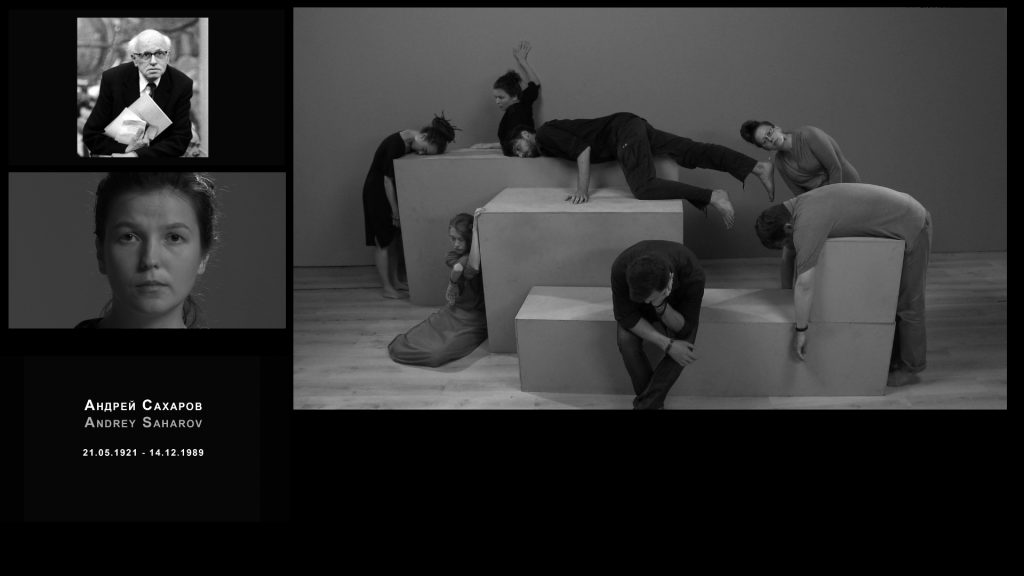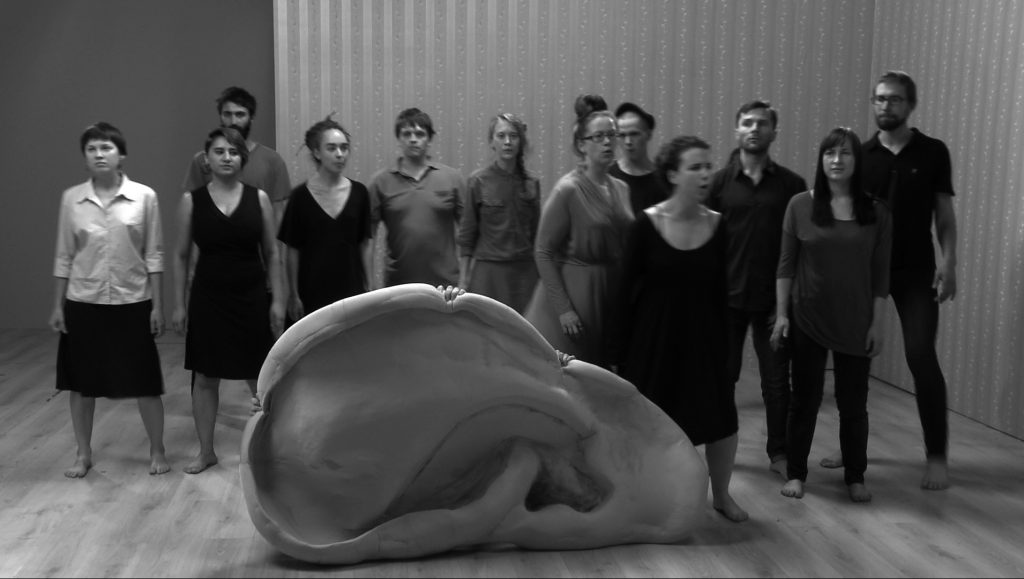Chto Delat
& Friends
Chto Delat and The School of Engaged Art
Manifesta 10, St. Petersburg
19.09.14 – 21.09.14
We meet in the foyer of the LenDok cinema in 12 Kryukov Canal. It is the oldest cinema in Saint Petersburg, established in 1918, soon after the October Revolution broke out. A large crowd has gathered in front of the venue: the screening of the latest film by the Russian collective Chto Delat is about to begin. It’s a warm day, most people are standing outside. The golden domes of the Church of the Epiphany of Our Lord emerge from the other side of the canal. Finally, Dmitry Vilensky arrives. Wearing jeans, he puffs on his e-cigarette. He looks like a mix of a magician and a businessman, oozing confidence, surrounded by the students of the School for Engaged Art, which he founded in 2013.
Vilensky enjoys an extremely inconsistent reputation in Saint Petersburg. He has been called a charlatan, a great artist, and, more recently, the last true Marxist. He is accused of selling out revolutionary ideas. Selling himself to the West for next to nothing. He is said to be either in possession of an Italian-style villa near the city or to live in a communal flat on the 17th floor. Like any artist would, Vilensky is thrilled by the fuss around him and repeatedly makes contradictory statements about himself. He readily fits into the role of a trickster – an unpredictable spirit that wreaks havoc wherever he appears.
But let us gather some facts. The Russian collective Chto Delat ( What is to be done? ) was established in 2003 in Saint Petersburg by a group of politically engaged artists, critics, philosophers and writers. They are mainly famous for their performances, such as Pierestroika Songspiele or The Tower, which they call ‘learning plays’ after Bertolt Brecht’s Lehrstücke. All of them have a similar structure and concern such issues as the controversial Gazprom tower in Saint Petersburg and forced relocations caused by the construction of a new stadium in Belgrade. Chto Delat’s make-up is not permanent, members come and go. Current and former participants include Keti Chukhrov, Oxana Timofeeva and Artiom Magun. Apart from artists, Chto Delat also gathers renowned and highly esteemed contemporary Russian philosophers, who lecture both in Russia and in the West. Some of them launch their own artistic activity stimulated by their experience of the collective. For instance, the philosopher Keti Chukhrov has been developing her own video art practice for two years. Her film Love Machines was shown, among others, at the Göteborg Biennial and at Garage in Moscow. Known primarily for her articles devoted to animals, Oxana Timofeeva is involved in activities around the Jérôme Poggi Gallery; the philosopher has participated in their latest group exhibition ʻHisterical Materialismʼ, among other projects.
On the day of the screening, most members of Chto Delat appear in the foyer of the LenDok cinema. They arrive for the premiere of the new film and the conference titled ʻNo Radical Art Will Helpʼ, organised within Manifesta 10. Vilensky jokes that these people are his network of spies-apostles who operate all over the world: in Berlin, Paris, Kiev, Novosibirsk, Sydney. They preach ‘the Gospel according to Chto Delat’ across the globe. Their message can be conveyed through a broad range of media: films, lectures, poems, performances. Thus, the collective retains an all-embracing presence at art galleries, universities, in young poets’ apartments.
Indeed, the most interesting layer of Chto Delat’s creative practice is the discourse that the collective develops around itself through public statements, its newspaper, meetings, interviews, its school, numerous conferences and performative readings. In the sphere of media and communication, Chto Delat is a real force of nature. Text and the Internet provide a setting where members of the collective feel at home. Their presence is also strongly felt in universities in Russia, where the legacy of the Russian avant garde is discussed in the context of the collective’s activity. Reading lists for philosophy seminars include their magazine, which features new ( often the first Russian ) translations of texts by Jacques Rancière, Gerald Raunig, Alain Badiou and Antonio Negri, among other figures. One of the collective’s greatest achievements is also the promotion of young poets’ work. Their public meetings involve the reading of poems by the permanent member Alexander Skidan, who writes: ‘red-and-brown plague / new order of the chosen / the sun is going so fast / young birches / semiconductors / dream spectres / clipped fingernails / resistance is futile’.

Chto Delat, The Excluded: In a Moment of Danger, 2014. Courtesy of the artists. Chto Delat,《被排除的:危险一刻》2014。承蒙艺术家惠允使用。
The last volume of Skidan’s poems, published in 2008,is entitled Red Shifting. The title refers directly to Marxist philosophy, which informs the activity of Chto Delat. A task that does not seem easy in a country where – as the artists admit – most people begin to run as soon as Karl Marx is mentioned. Yet, in the eyes of the collective, Marxism was and still is the only political force that can consistently and systematically criticise the ideological and economic order of capitalism. On top of that, in an era of rampant globalisation of neoliberal economy, Marxism gains new currency and force.
Karl Marx provides a reference that constantly recurs in the writings of the Russian collective ( and builds a context for all the world’s miseries ). Quoting Marx has always been de rigeur in artistic milieux, which is why such statements should be approached with particular caution. Nowadays, someone who calls themselves a Marxist may have never even laid their hands on Das Kapital. And what about Chto Delat? Even a cursory reading of their texts reveals a thorough knowledge of Marx. His modern-day ‘reanimation’ is meant to offer a solution to the degradation of Russian social and economic life. Chto Delat’s particular mission can be defined as efforts to exercise Marx’s writings in Russia in order to situate his ideas once again in public debate. However, a more detailed analysis clearly reveals that the goal of Chto Delat’s goal does not consist of a return to traditional Marxism, however: quite the opposite, their ideas are a perfect example of what can nowadays be called post-Marxism or cultural Marxism. The core of activities is the symbolic layer of society, and not the real economic base. In this respect, Chto Delat represent typical Western Marxism of the early 21st century. Marx’s scheme has been reversed – instead of modifying the base, the collective began with the superstructure, abandoning the revolutionary struggle for the sake of transforming the socio-economic structure in favour of their pursuit to change awareness. Revolution is understood as a cultural revolt, yet the essential change does not embrace the material structure of society but its ideological components.
However, there is a dimension of Chto Delat’s activity that I respond to with genuine enthusiasm. It is related to the School of Engaged Art, established by the collective in 2013, which has quickly become a magnet for the younger generation of artists in Russia and from the former Soviet Republics. It functions as an impromptu mix of a college, a school of civic education and an academy of fine arts. All projects ( mainly performances and video ) are created collectively and pursue the goal of finding a new artistic language that will be adequate to the escalating political situation in Russia.
Tonight, the LenDok cinema hosts the premiere of Chto Delat’s new film The Excluded. In a Moment of Danger, made with the students of the final year of the School of Engaged Art and commissioned by the 2014 São Paulo Biennial. The work comprises a number of episodes which portray a group of very young people in an abstract setting. Person after person, they are invited to the camera to share their short monologues: ‘I was born 2,348 km from Maidan, three hours after Yeltsin was elected the President of Russia in 1991, five steps from the statue of Lenin in my hometown.’ or ‘I’m 2,000 kilometres away from the battle for the Donetsk airport and 20 years from the first war in Chechnya’. Thus, a complex cartography emerges that defines each person through political and historical coordinates such as the Russian Revolution, the annexation of Crimea, wars in Serbia and Iraq. Then, the atmosphere suddenly changes. It turns out that everyone has a skeleton in their closet: one young man is Muslim, one girl is ‘fucking scared’ as a lesbian, someone has Jewish origins, someone is running away from the army draft. As I mentioned before, the School for Engaged art attracts young artists from all the ex-Soviet Republics: Ukrainians, Georgians, Tatars, Estonians. They often arrive in Saint Petersburg with nothing else but a single suitcase. The school offers them a chance to develop their artistic work in a tolerant international environment – a safe haven amidst the brutal reality of contemporary Russia.
We leave the cinema late at night. The streets of the Sennaya district are empty at this time. Fyodor Dostoyevsky used to live in this area, and Crime and Punishment is set here. A friend shows me a supermarket on the corner: this is where the pawnbroker Alyona Ivanovna lived. As we walk on, he grumbles about a discount store chain that drives local shops out of business. About motorcyclists who race along the Nevsky Prospect enjoying total impunity. About the impotence of the Russian intelligentsia. At a woman who shouted at him in a shop because he was not sure what to buy. He concludes with a rhetorical question: chto delat?
Chto Delat与朋友们
Chto Delat与参与性艺术学校
圣彼得堡,第十届宣言展
2014年9月19日至9月21日
译者:张涵露
我们在克鲁科夫河道12号的LenDok电影院见面,那是圣彼得堡历史最悠久的一家影院,创办于1918年‘十月革命’爆发不久后。当时,影院前聚集了大量人群,俄罗斯创作小组Chto Delat的最新影片即将在这里放映。那天很暖和,大多数人站在外边,主显教堂的金色穹顶在位于运河另一边露出身影。德米特里·维兰斯基姗姗来迟,他穿着牛仔裤,抽着电子烟,看起来像是魔术师与商人的结合。维兰斯基流露出非凡的自信,同时被自己于2013创办的参与性艺术学校的学生们包围着。
维兰斯基在圣彼得堡的名声极其不统一,他曾被称作是骗子、伟大的艺术家,以及最近的‘最后一位真正的马克思主义者’。他被指责兜售革命想法,以及向西方近乎零回报的自我推销。据传他拥有一座位于城郊的意大利风格别墅,同时他也可能住在一座位于17层的公社寓所中。正如任何艺术家,维兰斯基易受周围环境影响,并反复作出矛盾的自我声明。说他是一个江湖骗子再合适不过了——他那难以预测的精神总能成功在每一处他现身的地方制造出混乱。
让我们先看一些事实吧。俄罗斯小组Chto Delat(‘还能做什么?’)成立于2003年,由当时圣彼得堡的一群政治上活跃的艺术家、评论家、哲学家以及作家组成。他们的行为表演很著名,作品诸如《经济改革歌唱剧》以及《塔》,他们称之为‘教育剧’,这个术语来自于贝尔托·布莱希特。这些作品都拥有类似的结构,他们的关注点包括了颇具争议的圣彼得堡Gazprom( 译注:俄罗斯能源企业 )大厦以及贝尔格雷德一个新体育馆建造施工导致的强拆问题。Chto Delat的成员构成是流动的,里面的成员来去自由。现有及曾经的参与者包括凯蒂·楚科洛夫、奥克萨娜·提莫菲娃,以及阿特姆·马艮。除了艺术家以外,Chto Delat还聚集了一些著名并已有很高名望的当代俄罗斯哲学家,他们频繁在国内外发表演说。他们中的一些还受到了参加小组经历的影响,开始了自己的艺术创作。比如,哲学家凯蒂·楚科洛夫已经进行了两年录像艺术创作。她的影片《爱的机器》被收录于哥德堡双年展,并在莫斯科的车库当代艺术博物馆展出。奥克萨娜·提莫菲娃主要因为研究动物的文章而出名,但如今她也积极参与Jérôme Poggi艺廊的一些列活动,包括最新的群展‘歇斯底里的唯物论’。
在放映的这天,Chto Delat中的大部分成员都出现在LenDok影院的前厅中,他们这次到来是为了最新影片的首映以及一个名为《这边的激进艺术不会帮忙》的会议,后者是第十届宣言展组织的活动之一。维兰斯基开玩笑说,这些人是他交际网络中的‘间谍使徒’,他们活跃在世界各地:柏林、巴黎、基辅、新西伯利亚、悉尼……他们在全球范围内宣扬‘Chto Delat福音’,其中的讯息由各式各样的媒介来传达:电影、讲座、诗歌、表演……因此,小组在各个艺廊、大学,以及年轻诗人的公寓中保持着一种包罗万象的存在。
诚然,Chto Delat的创作中最为迷人的讨论层面在于小组通过公共声明、自己的报纸、会议、访谈、自己的学校、无数学术论坛,以及各种表演性的朗读会,发展出一套完整的体系。在媒体和传播领域,Chto Delat如鱼得水,文本和互联网这些媒介仿佛是为他们量身定做的。他们在俄罗斯的大学里也留下的强烈的印记,在那里,他们的实践成为了俄罗斯前卫艺术的讨论语境。各个哲学研讨会的阅读单上总会找到他们的杂志,在上面,读者可以接触到雅克·朗西埃、吉拉德·劳宁格、阿兰·巴迪乌以及安东尼奥·内格里等人的新著作翻译( 也通常是俄罗斯语第一版 )。小组最伟大的成就之一是对年轻诗歌的兴趣,他们在公开聚会上总会朗读永久成员亚历山大·斯基丹的诗歌,诸如:‘红色的和棕色的瘟疫 / 被选中者的新秩序 / 太阳太快了 / 年轻的白桦树 / 半导体 / 梦的幽灵 / 剪下的指甲 / 反抗是徒劳的’。



Chto Delat,《被排除的:危险一刻》2014。承蒙艺术家惠允使用。Chto Delat, The Excluded: In a Moment of Danger, 2014. Courtesy of the artists.
斯基丹的最新诗集名《红色转移》,标题直指马克思主义哲学——Chto Delat的理论参考。艺术家承认,这对于一个大家一听到卡尔·马克思名字就拔腿逃跑的国家来说不是容易的任务。然而,在小组看来,马克思主义曾经是,也将一直是唯一能够前后一致地、系统性地批评资本主义经济秩序的政治势力。除此之外,在一个新自由主义经济肆虐全球的时代,马克思主义已然获得了某种新生,被赋予了新的力量。
卡尔·马克思为这个俄罗斯小组提供了参照,他的理论反复出现在他们的写作中( 并且为世界上的不同苦难构建出语境 )。在艺术生态中,引用马克思一直都是非常‘合乎礼节’的,所以我们需要谨慎看待他们的立场。如今如果有人自称为马克思主义者,很有可能他们的手从来没有碰触过《资本论》。那Chto Delat呢?哪怕是匆匆浏览他们的文章也可以看出他们对马克思有扎实的了解。他的现代版‘重生’可以为俄罗斯那日益衰败的社会和经济生活提供一种解决方案。Chto Delat的特殊使命在于:在俄罗斯为马克思的写作去污名化,以便将他的思想重新带回公共讨论中。然而,一个更加详细的分析表明,Chto Delat的目标并不始终都落在复兴传统马克思主义。恰恰相反,他们的创作完美地例证了所谓的后马克思主义或者文化马克思主义。他们行动的核心在于社会的象征层面,而非真正的经济基础。如此看来,Chto Delat代表了典型21世纪早期的西方马克思主义。马克思的构想颠倒了:小组并不是对基层进行调整,而是从上层结构入手;他们放弃为了改变经济社会结构而进行的革命斗争,而是致力于意识的改革。革命被理解为一种文化反叛,最核心的变革并没有发生在社会的真实结构中,而是在它的意识形态构成中。
然而,Chto Delat的实践中有一个维度我非常感兴趣,那就是参与性艺术学校的周边。这个学校由小组成员建立于2013年,很快便吸引了来自俄罗斯和前苏联各国的年轻艺术家。它是一种结合了大学、公民教育基地,以及美术院校的即兴混搭。其中的所有项目( 主要为行为表演和录像 )都是集体创作的,并致力于探寻足以撼动俄罗斯政治局势的新型艺术语言。
今晚,LenDok影院放映了Chto Delat的新片《被排除的:危险一刻》,这部作品是与参与性艺术学校应届毕业的学生一起完成,并由2014年圣保罗双年展委任制作。影片分为几个章节,在一个抽象的背景设置里面描绘了一群非常年轻的男女。这些年轻人一个接着一个来到摄像机前面,与观众分享一段短小的独白:‘我生于叶利钦被选为俄罗斯总统三小时后,在梅登外2348公里的一个地方,距离家乡的列宁雕塑仅五步之遥。’亦或:‘我距离Donetsk机场之役2000公里,距离车臣第一次战争二十年。’于是,一套复杂的地图学浮现,每个人都由政治与历史坐标定位,包括俄国革命、克里米亚吞并、塞尔维亚及伊拉克战争等。然后,气氛骤变,每个人都似乎藏着一个天大的秘密:一个年轻男子是穆斯林,一个女孩说她作为一个女同性恋者‘太他妈害怕了’,有人坦白自己的犹太血统,有人承认正在逃避兵役。正如我之前提到的,参与性艺术学校吸引了所有前苏联地区的年轻艺术家:乌克兰人、格鲁吉亚人、鞑靼人、爱沙尼亚人……他们通常只带着一个行李箱就空降圣彼得堡,学校则为他们提供了在包容的国际环境中拓展自身艺术创作的机会——相对于当代俄罗斯那严峻的现实来说学校就是一个避风港。
那天,我们很晚才离开了电影院,赛纳亚区的街道早已空无一人。费奥多尔·陀思妥耶夫斯基曾居住在这一地区,《罪与罚》的剧情设置也在这里。一个朋友跟我指了指一家街角超市说,当铺老板阿廖娜·伊万诺夫娜曾经住在那里。我们继续走着,朋友抱怨一家连锁折扣店把本地的商店的生意都抢光了,抱怨摩托车飙车族们在内夫斯基一带肆意妄为却总能逃过法网,抱怨俄罗斯知识阶层的无能……在商店里犹豫着不知要买什么时,他被店里的女人痛骂了一顿,于是他用一句反问句很好地总结了这一切:还能做什么?